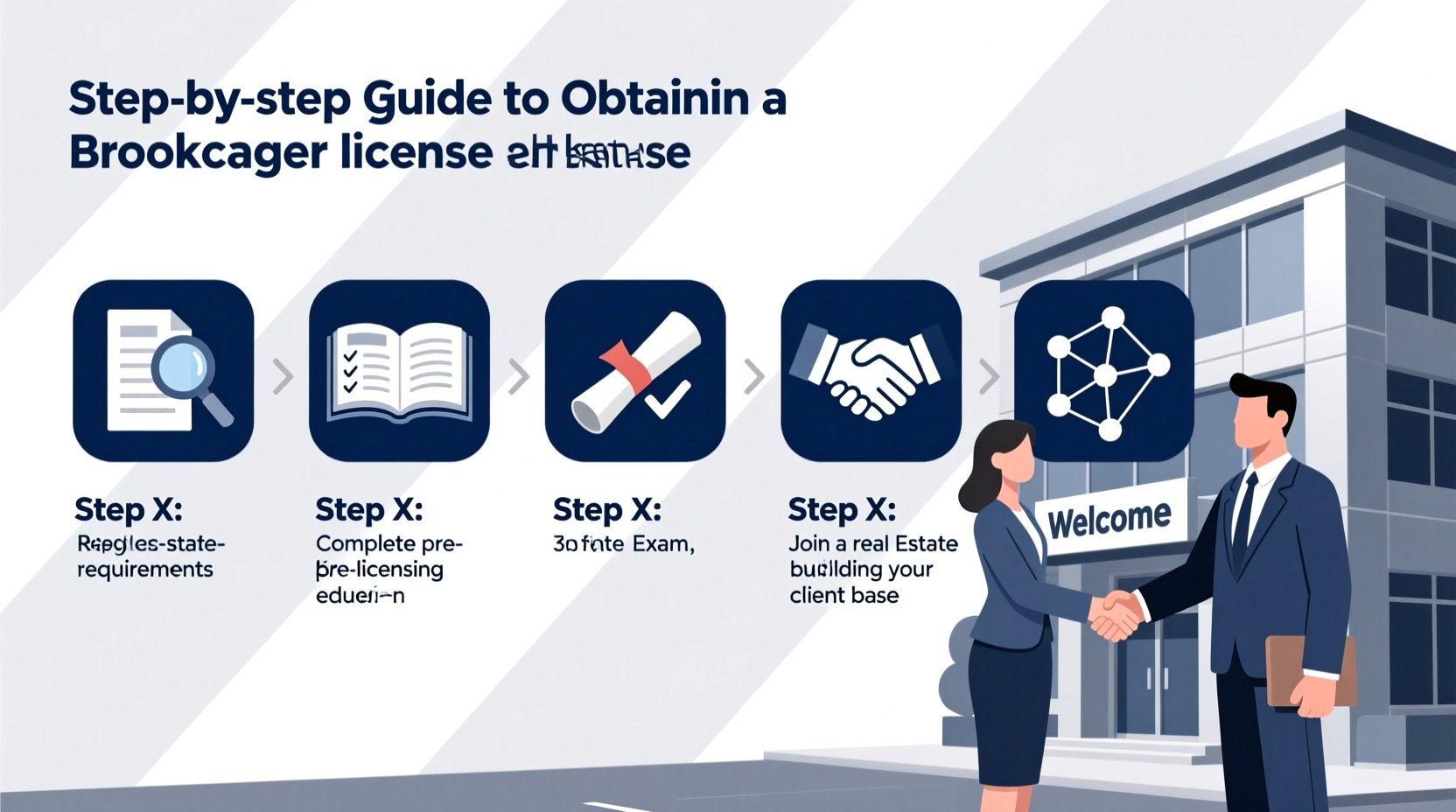Earning your real estate broker’s license is more than just a credential—it’s a strategic leap toward independence, leadership, and long-term financial growth in the real estate industry. Unlike a salesperson’s license, a broker’s license allows you to open your own brokerage, manage agents, and earn higher commissions. But the path requires preparation, persistence, and planning. This guide walks you through each phase—from eligibility to opening your doors—with actionable steps, expert insights, and real-world context.
Understand the Role of a Real Estate Broker

A real estate broker holds a higher-level license than a sales agent. Brokers can work independently, hire and supervise agents, handle trust accounts, and legally represent clients in transactions. There are three common types of brokers:
- Designated Broker: The licensed individual responsible for a brokerage’s legal and regulatory compliance.
- Managing Broker: Oversees daily operations and agent supervision within a firm.
- Broker Associate: A broker who works under another broker without managing others.
Becoming a broker means taking on greater responsibility, but it also opens doors to passive income, brand ownership, and professional autonomy.
Meet the Eligibility Requirements
Requirements vary by state, but most follow a similar framework. Below is a general overview of what you’ll need before applying.
| Requirement | Typical Standard | Notes |
|---|---|---|
| Age | 18 or 21 years old | Varies by state (e.g., Florida requires 18, California 18) |
| Licensing Experience | 2–3 years as an active sales agent | Time must be within the last 5 years in most states |
| Education | 60–90 hours of pre-licensing coursework | Courses cover real estate principles, law, finance, and ethics |
| Background Check | Fingerprinting and criminal history review | Felony convictions may disqualify applicants |
Check your state’s real estate commission website—such as the California Department of Real Estate or Texas Real Estate Commission—for exact criteria. Some states offer reciprocity, allowing experienced brokers from other states to apply with fewer requirements.
“Brokers aren’t just better licensed—they’re better positioned to build legacy businesses.” — Dana White, Broker-Owner of Horizon Realty Group
Complete Pre-Licensing Education
Once you confirm eligibility, enroll in a state-approved pre-licensing program. These courses are typically offered online or in person through accredited real estate schools.
Key topics include:
- Real estate law and contracts
- Property valuation and appraisal
- Agency relationships and fiduciary duties
- Financing, closing, and title processes
- Brokerage management and risk reduction
Most programs take 2–3 months to complete part-time. Choose a school that offers practice exams, instructor support, and up-to-date materials. Many students find success using platforms like Kaplan, Real Estate Express, or Colibri Real Estate.
Timeline: Pre-Licensing Phase
- Research approved schools in your state – Week 1
- Enroll and begin coursework – Week 2
- Dedicate 6–8 hours per week to study – Weeks 3–10
- Pass final course exam – Week 11
- Receive certificate of completion – Week 12
Pass the Real Estate Broker Exam
The broker exam is more advanced than the sales agent test. It consists of two parts:
- National Section: Covers general real estate principles applicable across states.
- State-Specific Section: Tests local laws, regulations, and transaction procedures.
Most exams are computer-based, administered by third-party providers like PSI or Pearson VUE. You’ll need to schedule your test through your state’s licensing portal after submitting your application and fees (typically $100–$200).
To prepare effectively:
- Use practice exams to identify weak areas.
- Focus on contract law, agency duties, and property management rules.
- Review your course materials and state statutes.
- Take timed tests to improve pacing.
Passing scores range from 70% to 75%, depending on the state. If you fail one section, you may only need to retake that portion, but check your state’s policy.
Mini Case Study: From Agent to Broker in 14 Months
Sarah Kim worked as a full-time real estate agent in Colorado for 2.5 years. After closing over 40 transactions, she decided to pursue her broker’s license to gain control over her business decisions. She completed 90 hours of pre-licensing education in 10 weeks while continuing to work. She studied two hours every evening and passed the exam on her first attempt. Within three months of licensing, she joined a boutique brokerage as a broker associate, increasing her commission split and qualifying for future partnership opportunities.
Apply for Your License and Choose Your Career Path
After passing the exam, submit your official application to your state’s real estate commission. Required documents usually include:
- Exam pass verification
- Course completion certificates
- Fingerprint submission
- Application fee payment
- Proof of errors and omissions (E&O) insurance (in some states)
Processing times vary—expect 2 to 6 weeks for approval.
Once licensed, decide how you want to use your credentials:
- Join an Existing Brokerage: Work as a broker associate without management duties.
- Start Your Own Brokerage: File an LLC, obtain a business license, secure E&O insurance, and register your firm with the state.
- Specialize: Focus on commercial, property management, or luxury markets where broker expertise is highly valued.
Checklist: Launching Your Broker Career
- ✅ Confirm eligibility with your state commission
- ✅ Complete required pre-licensing education
- ✅ Pass the broker licensing exam
- ✅ Submit application and supporting documents
- ✅ Obtain E&O insurance and bonding (if required)
- ✅ Decide between independent brokerage or affiliation
- ✅ Build a business plan, branding, and marketing strategy
- ✅ Recruit agents (if opening your own firm)
Frequently Asked Questions
Can I become a broker without being a sales agent first?
No. All states require prior experience as a licensed real estate salesperson, typically 2–3 years of active practice. This ensures practical knowledge before assuming supervisory responsibilities.
How much more can I earn as a broker?
Earnings depend on your role. As a broker associate, you may negotiate higher commission splits (e.g., 70/30 instead of 60/40). If you open your own firm, you earn a share of your agents’ commissions—potentially tens of thousands annually—even while focusing on your own deals.
Is the broker exam harder than the sales agent exam?
Yes. The broker exam assumes deeper understanding of legal obligations, risk management, and operational procedures. It often includes scenario-based questions requiring judgment, not just memorization.
Build Your Legacy with Purpose
Becoming a real estate broker isn’t just about passing a test—it’s about stepping into a leadership role with accountability and opportunity. Whether you choose to operate independently, launch a team, or start your own brokerage, your license is the foundation of a scalable, sustainable career. The journey demands time and effort, but the rewards—autonomy, increased income, and professional respect—are well worth it.









 浙公网安备
33010002000092号
浙公网安备
33010002000092号 浙B2-20120091-4
浙B2-20120091-4
Comments
No comments yet. Why don't you start the discussion?